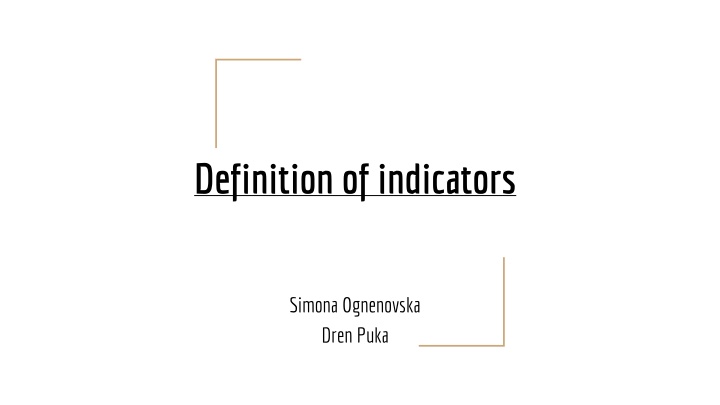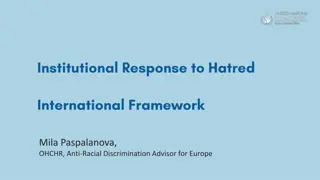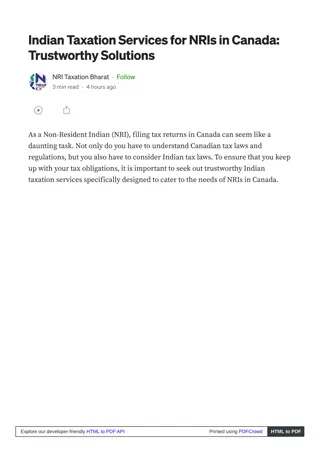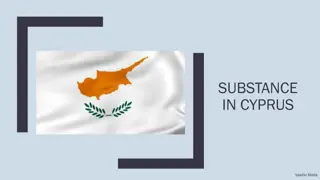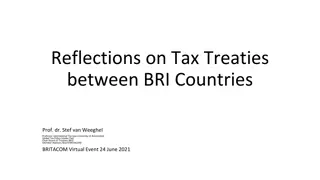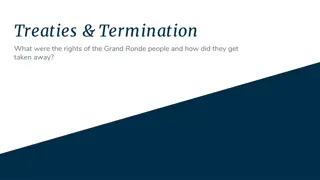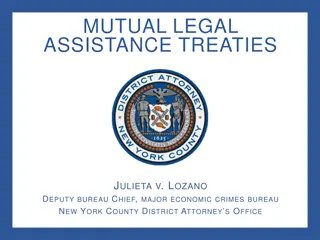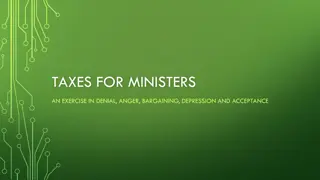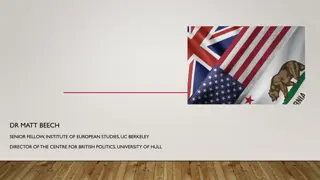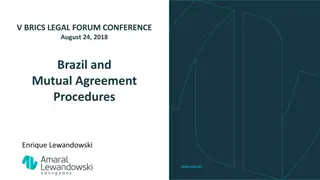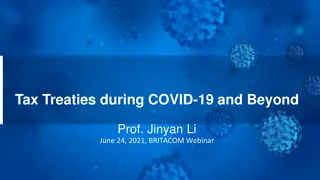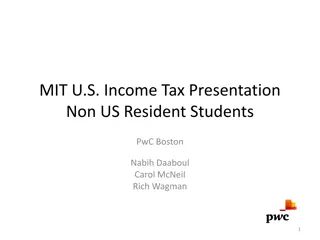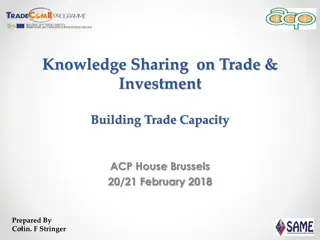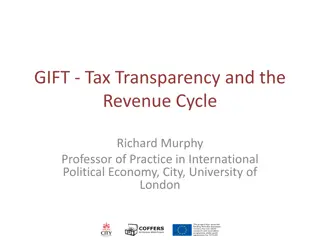Tax Treaties and Trade Agreements: Implications for British Columbia
Tax treaties and trade agreements play a crucial role in shaping national tax regimes and preventing tax discrimination. This overview delves into the implications of the Canada-EU CETA, focusing on double tax conventions, non-discrimination clauses, and the extensive tax treaty network of Canada.
Download Presentation

Please find below an Image/Link to download the presentation.
The content on the website is provided AS IS for your information and personal use only. It may not be sold, licensed, or shared on other websites without obtaining consent from the author.If you encounter any issues during the download, it is possible that the publisher has removed the file from their server.
You are allowed to download the files provided on this website for personal or commercial use, subject to the condition that they are used lawfully. All files are the property of their respective owners.
The content on the website is provided AS IS for your information and personal use only. It may not be sold, licensed, or shared on other websites without obtaining consent from the author.
E N D
Presentation Transcript
Definition of indicators Simona Ognenovska Dren Puka
Basis for development of definitions (docs) MM on EE for CS Dev tool-kit (descriptions per indicator) The categories for assessing indicators with explanations for legislation and practice (EE scale) Report: Making Efficient Implementation of the MM Research and Analysis Latest Methodology plan (excel document)
Basic rules that guided the development of definitions Use the descriptions and logic of the 5-points scale (where applicable) The definitions of the scores 1 and 5 mean that these are extremes 1 = Fully disabling, restriction/lack of guarantees, systematic pressures, numerous violations etc 5 = Fully enabling with examples that go beyond best practices Make full use of the description of the indicator in tool-kit (and the elements from the methodology plan) Carefulness with the provision of examples Zero tolerance on violations for point - 4 (change from EE score descriptions)
Testing exercise guidance Each country will test 6 indicators in legislation and practice from 3 different areas with definitions. Two countries will receive the same indicators for comparison). The task is to assign the 1-5 score following the provided definitions for your country for year 2017 and 2018 (based on the MM results)
Testing exercise guidance Please make note of all the difficulties/challenges you face when assigning a score * Please consider carefully if you feel comfortable assigning a score, and then backing up it up with concrete examples according to the definition. In plenary session, we will compare the scores you have provided and discuss certain differences as well as the issues you have noted.
Indicators for testing 2017 2018 Countries Testing exercise The legal framework provides guarantees against state interference in internal matters of associations, foundations and other types of non-profit entities. Practice Every individual or legal entity in practice can form associations, foundations or other non-profit, non-governmental organizations offline or online. There are no cases of state interference in internal matters of associations, foundations and other types of non-profit entities Area 1 Basic Legal Guarantees of Freedoms Legislation There is a legal framework according to which any person can establish associations, foundations and other types of non- profit, non-governmental entities (e.g., non-profit company) for any purpose. Albania Macedonia Area 2 Framework for CSO Financial Viability and Sustainability Legislation The law provides tax free treatment for all grants and donations supporting non-for-profit activity of CSOs. The law provides tax deductions for individual and corporate donations to CSOs Practice There is no direct or indirect (hidden) tax on grants reported There is a functional procedure in place to claim tax deductions for individual and corporate donations. Area 3 Government CSO Relationship Legislation There are strategic documents dealing with the state-CSO relationship and CSDev. There is a national level institution or mechanism with a mandate to facilitate cooperation with CSOs (e.g., Unit/Office for cooperation; contact points in ministries; council). Practice CSOs from different areas of interest regularly participate in all phases of the strategic document development, implementation and evaluation. The national level institution or mechanism(s) has sufficient resources and mandate for facilitating CSO-government dialogue, discussing the challenges and proposing the main policies for the development of civil society.
Indicators for testing 2017 2018 Countries Area 1 Basic Legal Guarantees of Freedoms Legislation CSOs are allowed to receive foreign funding The legal framework is based on international standards and provides the right for freedom of assembly for all without any BiH / Serbia/ Turkey Testing exercise discrimination. Practice There are no restrictions (e.g. administrative or financial burden, preapprovals, or channeling such funds via specific bodies) on CSOs to receive foreign funding. There are no cases of encroachment of the freedom of assembly, and any group of people can assemble at desired place and time, in line with the legal provisions. Area 2 Framework for CSO Financial Viability and Sustainability Legislation There is a law or national policy (document) that regulates state support for institutional development for CSOs, project support and co-financing of EU funded projects. The procedure for distribution of public funds is transparent and legally binding. Practice Available public funding responds to the needs of the CSO sector. Information relating to the procedures for funding and information on funded projects is publicly available. Area 3 Government CSO Relationship Legislation There are clearly defined standards on the involvement of CSOs in the policy and decision making processes in line with best regulatory practices prescribing minimum requirements which every policy-making process needs to fulfill. Existing legislation obliges public institutions to make all draft and adopted laws and policies public, and exceptions are clearly defined and in line with international norms and best practices. Practice Public institutions routinely invite all interested CSOs to comment on policy/ legal initiatives at an early stage. Public institutions actively publish draft and adopted laws and policies, unless they are subject to legally prescribed exceptions.
Countries Indicators for testing 2017 2018 Testing exercise Restrictions, such as limitation of hate speech, imposed by legislation are clearly prescribed and in line with international law and standards. Practice There are cases of freedom of assembly practiced by CSOs (individually or through their organizations) without prior authorization; when notification is required it is submitted in a short period of time and does not limit the possibility to organize the assembly. There are no cases of encroachment of the right to freedom of expression for all. Area 1 Basic Legal Guarantees of Freedoms Legislation The exercise of the right is not subject to prior authorization by the authorities, but at the most to a prior notification procedure, which is not burdensome. Kosovo / Montenegro Area 2 Framework for CSO Financial Viability and Sustainability Legislation CSOs are treated in an equal manner to other employers by law and policies. Legislation stimulates volunteering and incorporates best regulatory practices, while at the same time allowing for spontaneous volunteering practices. Practice If there are state incentive programs for employment, CSOs are treated like all other sectors. Incentives and programs are transparent and easily available to CSOs and the policy, strategic document or law is being fully implemented, monitored and evaluated periodically in a participatory manner. Area 3 Government CSO Relationship Legislation Existing legislation requires public institutions to invite CSO representatives on to different decision-making and/or advisory bodies created by public institutions. Existing legislation does not add additional burdensome requirements on CSOs that do not exist for other service providers. Practice Decision-making and advisory bodies on issues and policies relevant for civil society generally include CSO representatives. When prior registration/licensing is required, the procedure for obtaining it is not overly burdensome.
Main challenges for discussion Finding proper examples (for the extremes) - is it necessary Indicators which are too general for e.g. The state provides protection from interference from third parties. Indicators which lack substantial explanations e.g. Every indicator is challenging in a different way For some the EE scores descriptions were useful, for others not
Main challenges for discussion Indicators in legislation, contain description which refers to practice (or it is not clear) Specific challenges (e.g. why and how do we hold the state responsible if no one is interested in establishing endowment). Outdated concept of CSR, other? Carefulness with the usage of vague words ( for e.g. signals, easy, burdensome, etc.)
New challenges identified Somewhere in between (2.5) - they are quite specific Scoring of 5 surpasses international standard s build common understanding what we understand under 5 Indictors are specific the reports are not so specific always Not all definitions are clear The difference between 2 and 3 (or and 4) The described elements should not be limiting
